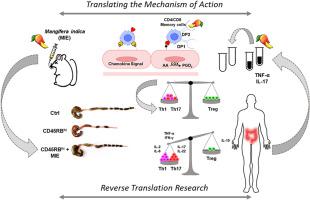当前位置:
X-MOL 学术
›
J. Autoimmun.
›
论文详情
Our official English website, www.x-mol.net, welcomes your feedback! (Note: you will need to create a separate account there.)
A reverse translational approach reveals the protective roles of Mangifera indica in inflammatory bowel disease
Journal of Autoimmunity ( IF 12.8 ) Pub Date : 2024-03-23 , DOI: 10.1016/j.jaut.2024.103181 Anella Saviano , Anna Schettino , Nunzia Iaccarino , Adel Abo Mansour , Jenefa Begum , Noemi Marigliano , Federica Raucci , Francesca Romano , Gelsomina Riccardi , Emma Mitidieri , Roberta d'Emmanuele di Villa Bianca , Ivana Bello , Elisabetta Panza , Martina Smimmo , Valentina Vellecco , Peter Rimmer , Jonathan Cheesbrough , Zhaogong Zhi , Tariq H. Iqbal , Stefano Pieretti , Vincenzo Maria D'Amore , Luciana Marinelli , Valeria La Pietra , Raffaella Sorrentino , Luisa Costa , Francesco Caso , Raffaele Scarpa , Giuseppe Cirino , Antonio Randazzo , Mariarosaria Bucci , Helen Michelle McGettrick , Asif Jilani Iqbal , Francesco Maione
Journal of Autoimmunity ( IF 12.8 ) Pub Date : 2024-03-23 , DOI: 10.1016/j.jaut.2024.103181 Anella Saviano , Anna Schettino , Nunzia Iaccarino , Adel Abo Mansour , Jenefa Begum , Noemi Marigliano , Federica Raucci , Francesca Romano , Gelsomina Riccardi , Emma Mitidieri , Roberta d'Emmanuele di Villa Bianca , Ivana Bello , Elisabetta Panza , Martina Smimmo , Valentina Vellecco , Peter Rimmer , Jonathan Cheesbrough , Zhaogong Zhi , Tariq H. Iqbal , Stefano Pieretti , Vincenzo Maria D'Amore , Luciana Marinelli , Valeria La Pietra , Raffaella Sorrentino , Luisa Costa , Francesco Caso , Raffaele Scarpa , Giuseppe Cirino , Antonio Randazzo , Mariarosaria Bucci , Helen Michelle McGettrick , Asif Jilani Iqbal , Francesco Maione

|
Inflammatory bowel diseases (IBDs) are chronic intestinal disorders often characterized by a dysregulation of T cells, specifically T helper (Th) 1, 17 and T regulatory (Treg) repertoire. Increasing evidence demonstrates that dietary polyphenols from L. extract (MIE, commonly known as mango) mitigate intestinal inflammation and splenic Th17/Treg ratio. In this study, we aimed to dissect the immunomodulatory and anti-inflammatory properties of MIE using a reverse translational approach, by initially using blood from an adult IBD inception cohort and then investigating the mechanism of action in a preclinical model of T cell-driven colitis. Of clinical relevance, MIE modulates TNF-α and IL-17 levels in LPS spiked sera from IBD patients as an model of intestinal barrier breakdown. Preclinically, therapeutic administration of MIE significantly reduced colitis severity, pathogenic T-cell intestinal infiltrate and intestinal pro-inflammatory mediators (IL-6, IL-17A, TNF-α, IL-2, IL-22). Moreover, MIE reversed colitis-induced gut permeability and restored tight junction functionality and intestinal metabolites. Mechanistic insights revealed MIE had direct effects on blood vascular endothelial cells, blocking TNF-α/IFN-γ-induced up-regulation of COX-2 and the DP2 receptors. Collectively, we demonstrate the therapeutic potential of MIE to reverse the immunological perturbance during the onset of colitis and dampen the systemic inflammatory response, paving the way for its clinical use as nutraceutical and/or functional food.
中文翻译:

反向翻译方法揭示了芒果在炎症性肠病中的保护作用
炎症性肠病 (IBD) 是一种慢性肠道疾病,通常以 T 细胞失调为特征,特别是辅助性 T 细胞 (Th) 1、17 和调节性 T 细胞 (Treg) 失调。越来越多的证据表明,L. 提取物(MIE,俗称芒果)中的膳食多酚可减轻肠道炎症和脾脏 Th17/Treg 比率。在这项研究中,我们旨在使用逆翻译方法剖析 MIE 的免疫调节和抗炎特性,首先使用成人 IBD 起始队列的血液,然后研究 T 细胞驱动的结肠炎临床前模型中的作用机制。具有临床相关性的是,MIE 可调节 IBD 患者的 LPS 加标血清中的 TNF-α 和 IL-17 水平,作为肠道屏障破坏的模型。临床前,MIE 的治疗性给药可显着降低结肠炎的严重程度、致病性 T 细胞肠道浸润和肠道促炎介质(IL-6、IL-17A、TNF-α、IL-2、IL-22)。此外,MIE 逆转了结肠炎引起的肠道通透性,恢复了紧密连接功能和肠道代谢。机制研究表明,MIE 对血管内皮细胞有直接影响,阻断 TNF-α/IFN-γ 诱导的 COX-2 和 DP2 受体的上调。总的来说,我们证明了 MIE 的治疗潜力,可以逆转结肠炎发作期间的免疫紊乱并抑制全身炎症反应,为其作为营养保健品和/或功能性食品的临床应用铺平道路。
更新日期:2024-03-23
中文翻译:

反向翻译方法揭示了芒果在炎症性肠病中的保护作用
炎症性肠病 (IBD) 是一种慢性肠道疾病,通常以 T 细胞失调为特征,特别是辅助性 T 细胞 (Th) 1、17 和调节性 T 细胞 (Treg) 失调。越来越多的证据表明,L. 提取物(MIE,俗称芒果)中的膳食多酚可减轻肠道炎症和脾脏 Th17/Treg 比率。在这项研究中,我们旨在使用逆翻译方法剖析 MIE 的免疫调节和抗炎特性,首先使用成人 IBD 起始队列的血液,然后研究 T 细胞驱动的结肠炎临床前模型中的作用机制。具有临床相关性的是,MIE 可调节 IBD 患者的 LPS 加标血清中的 TNF-α 和 IL-17 水平,作为肠道屏障破坏的模型。临床前,MIE 的治疗性给药可显着降低结肠炎的严重程度、致病性 T 细胞肠道浸润和肠道促炎介质(IL-6、IL-17A、TNF-α、IL-2、IL-22)。此外,MIE 逆转了结肠炎引起的肠道通透性,恢复了紧密连接功能和肠道代谢。机制研究表明,MIE 对血管内皮细胞有直接影响,阻断 TNF-α/IFN-γ 诱导的 COX-2 和 DP2 受体的上调。总的来说,我们证明了 MIE 的治疗潜力,可以逆转结肠炎发作期间的免疫紊乱并抑制全身炎症反应,为其作为营养保健品和/或功能性食品的临床应用铺平道路。



























 京公网安备 11010802027423号
京公网安备 11010802027423号